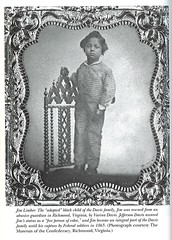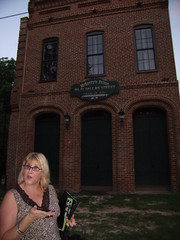With this post, I continue work on my study guide for my collection of historical short fiction, Stories of the Confederate South.
LESSON #4: “The Taking of Jim Limber”
Summary of Story: After Jefferson Davis was captured, arrested, and taken to prison at the end of the war, Jim Limber was taken from the Davis family by force. The child was never seen or heard from again. When Davis was released two years later, he searched for news of Jim,’s welfare, but other than rumors, he never discovered anything. Remember too that Jefferson Davis was the most powerful and well-known man of the South. He knew everyone important in the South and many who were important in the North. When any child is taken from a family by force and nothing is heard for years, we tend to assume the worst. This story assumes the worst, and certainly Jim Limber would not have been the first child of the South—whether black or white—to die at the hands of the Northern invaders.
Both Jefferson and Varina died without knowing what happened to Jim Limber. Those who took Jim away from the Davis family died with the secret. His disappearance remains one of the great mysteries of history. This story is speculative historical fiction, told from the point of view of one of the soldiers involved in “The Taking of Jim Limber.” It would be helpful for the student or class to also read, Jim Limber Davis: A Black Orphan in the Confederate White House. In addition, it would be helpful for students to use a good data base to find images of many items mentioned in this story.
Opening Epigraph:
“My fault is past. But, O, what form of prayer Can serve my turn? ‘Forgive me my foul murder’?
This epigraph is from Shakespeare’s Hamlet. Discuss the original context of the quotation, the tone it sets, and the direction it pushes the story.
Bible Quotation: (Isaiah 57:20)
“But the wicked are like the troubled sea, when it cannot rest, whose waters cast up mire and dirt. There is no peace, said my God, to the wicked . . .”
Latin Quotation:
Tempora mutantur et nos mutamur in illis. (Times change and we change with them)
Discuss the meaning of this quotation in the context of the story. Encourage students to find their favorite Latin quotation.
Vocabulary:
1. laudanum – liquid, alcoholic, herbal, opium-based medicine.
2. euphoria – feeling of well-being
3. mooring – a place where or an object to which something (as a craft) can be moored b: a device (as a line or chain) by which an object is secured in place
4. undertow – current beneath the surface that sets seaward or along the beach when waves are breaking upon the shore
5. rag parchment – paper made from cotton.
6. secessionist – Synonym for a Southerner, one who believed the Southern states had the Constitutional right to leave the Union.
7. tampion – a plug for the end of the muzzle loading rifles used in the Civil War.
8. slouch hat – a wide-brimmed felt hat.
9. tableau – a frozen moment on stage.
10. the devil’s tattoo – a drumbeat calling soldiers to formation or battle.
11. nimbus – a circle) of radiant light or glory about the head of a drawn or sculptured divinity, saint, or sovereign
12. phantasm – Literally, an image of the fancy or imagination. Suggests a ghost-like appearance.
13. whirli-jig – Also spelled “whirligig.” A child’s toy that made a whirling noise.
14. daguerreotype – an early photograph produced on a silver or a silver-covered copper plate
15. shadenfreude – joy in the suffering of others.
16. canister – encased shot for artillery. Canister made a cannon a giant shotgun.
17. hansom – a light 2-wheeled covered carriage with the driver’s seat elevated behind
18. Uncle Tom’s Cabin – Anti-slavery novel by Harriet Beecher Stowe.
19. “quicklime white beam of the followspot” – 19th century version of a spotlight.
20. abolitionists – Abolitionists wanted to abolish slavery. However, some abolitionists were prejudiced, and though they wanted to end slavery, they did not want people of color in America at all.
Themes: (To write about or discuss)
1. Prejudice existed in the North as well as in the South during the Civil War.
2. In war, the innocent and the children often suffer.
3. Jim Limber was the first black American to be a member of a presidential family.
4. The power and pain of a guilty conscience.
Here is a photo of Jim Limber:



